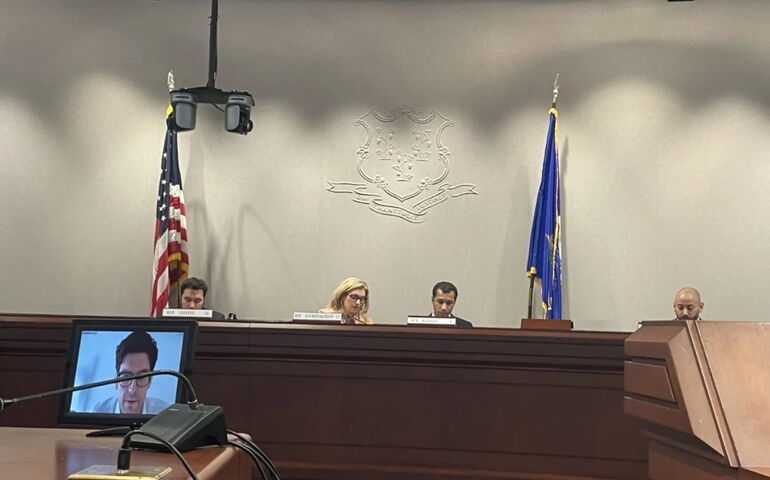Processing Your Payment
Please do not leave this page until complete. This can take a few moments.
-
News
-
Editions
-
- Lists
-
Viewpoints
-
HBJ Events
-
Event Info
- 2024 Economic Outlook Webinar Presented by: NBT Bank
- Best Places to Work in Connecticut 2024
- Top 25 Women In Business Awards 2024
- Connecticut's Family Business Awards 2024
- What's Your Story? A Small Business Giveaway 2024 Presented By: Torrington Savings Bank
- 40 Under Forty Awards 2024
- C-Suite and Lifetime Achievement Awards 2024
- Connecticut's Health Care Heroes Awards 2024
-
-
Business Calendar
-
Custom Content
- News
-
Editions
View Digital Editions
Biweekly Issues
- April 29, 2024
- April 15, 2024
- April 1, 2024
- March 18, 2024
- March 4, 2024
- February 19, 2024
- February 5, 2024
- January 22, 2024
- January 8, 2024
- + More
Special Editions
- Lists
- Viewpoints
-
HBJ Events
Event Info
- View all Events
- 2024 Economic Outlook Webinar Presented by: NBT Bank
- Best Places to Work in Connecticut 2024
- Top 25 Women In Business Awards 2024
- Connecticut's Family Business Awards 2024
- What's Your Story? A Small Business Giveaway 2024 Presented By: Torrington Savings Bank
- 40 Under Forty Awards 2024
- C-Suite and Lifetime Achievement Awards 2024
- Connecticut's Health Care Heroes Awards 2024
Award Honorees
- Business Calendar
- Custom Content
Bill advances to expand definition of ‘line of duty’ deaths
 LUKE FEENEY / CONNECTICUT MIRROR
Planning and Development Committee members Brandon Chafee, Eleni Kavros DeGraw and MD Rahman.
LUKE FEENEY / CONNECTICUT MIRROR
Planning and Development Committee members Brandon Chafee, Eleni Kavros DeGraw and MD Rahman.
The Planning and Development Committee on Monday passed a bill that would expand certain workers’ compensation benefits for the families of police officers and firefighters who die within 24 hours of a shift from issues such as heart attacks and strokes.
House Bill 5279 would allow police or fire chiefs to declare that department deaths or disabilities that occur within 24 hours of shifts that involve strenuous activities took place in the line of duty. The bill came to the Planning and Development Committee from the Public Safety Committee.
It has bipartisan support from lawmakers. But the legislative session ends in less than a month, and time is waning to pass bills through the chambers.
“Our first responders play a vital role in protecting our communities, and their sacrifices and hard work cannot be overstated,” said Sen. Saud Anwar, D-South Windsor, in written testimony in support of the bill. “This bill would help address those concerns by ensuring that medical emergencies that arise on the job during or after training or service would be considered in the line of duty.”
“Conditions that affect blood flow and blood vessels, as well as blockages in the lungs, are serious and require full medical attention. When pulmonary embolisms or cerebrovascular incidents occur among those who work to serve the public, they can be correlated directly to the high demands and extreme stress that first responders experience in their roles.”
The bill, which got little discussion in Monday’s committee meeting, would cover deaths from stroke, cardiac events or a pulmonary embolism.
Nonprofit group Officer Down Memorial Page has counted 38 line of duty deaths for police officers in the U.S. so far this year. Last year, it counted 136.
The U.S. Fire Administration has counted 21 line of duty deaths so far this year for firefighters. In 2021, there were 141 deaths counted, 63 of which were from COVID-19.
Families of police officers and firefighters killed in the line of duty can be eligible for state and local benefits including college tuition waivers, fire and police association payments, state health insurance benefits, a property tax abatement and survivor pension benefits.
Police and fire chiefs would be able to declare the death “in the line of duty” unless the town has an ordinance in effect by July 1 that authorizes a different person to make the determination.
The bill’s fiscal analysis notes that impact to the state would be minimal. The state would need to absorb the cost of tuition waivers, which would be about $4,600 to $17,000, depending on the school.
The Department of Emergency Services and Public Protection would also have to pay death benefits to the family of police officers killed in the line of duty, if they are members of the Police Association of Connecticut. Death benefits are $20,000, plus $100 per week per child until the children are 18.
Survivor benefits from the state could cost between $11,600 and about $30,300 per occurrence. Municipalities could pay between $13,900 and about $36,000 for medical plan premiums.
The property tax abatement wouldn’t affect towns unless they have passed ordinances allowing tax abatement for surviving spouses of people who die in the line of duty, according to bill documents.
Firefighter and police organizations supported the bill. North Haven Fire Chief Paul Januszewski testified about two deaths within his department in the last two years. Both were cardiac emergencies, he said.
The difference was that one occurred while the firefighter was at the scene of a fire and the other was a little over two hours after his shift. While he eventually ruled both line-of-duty deaths, town leadership pushed back against the ruling for the firefighter who died after his shift, Januszewski wrote.
“The very nature of what firefighters and police officers do every day is different from nearly every other job that exists,” he wrote. “Cardiac events on duty due to exertion, environmental factors and stressors are part of the risk we take.”
Some town officials opposed the bill.
Old Saybrook First Selectman Carl Fortuna submitted testimony against it on behalf of the Connecticut Conference of Municipalities. He said he was concerned that it would shift the burden of proof from the individual to the employer to determine causation in workers compensation claims.
“Most alarming, this proposal would not only create a new mandate for these incidents, it extends the timeframe to include anytime twenty-four hours after their shift or training,” Fortunata wrote. “This is highly problematic as this extensive period of time ignores critical determining factors, such as family medical history, lifestyle habits, and diet which may have contributed to the incident.”

2022 Giving Guide
This special edition informs and connects businesses with nonprofit organizations that are aligned with what they care about. Each nonprofit profile provides a crisp snapshot of the organization’s mission, goals, area of service, giving and volunteer opportunities and board leadership.
Learn more
Subscribe
Hartford Business Journal provides the top coverage of news, trends, data, politics and personalities of the area’s business community. Get the news and information you need from the award-winning writers at HBJ. Don’t miss out - subscribe today.
Subscribe
2024 Book of Lists
Delivering Vital Marketplace Content and Context to Senior Decision Makers Throughout Greater Hartford and the State ... All Year Long!
Read Here-
2022 Giving Guide
This special edition informs and connects businesses with nonprofit organizations that are aligned with what they care about. Each nonprofit profile provides a crisp snapshot of the organization’s mission, goals, area of service, giving and volunteer opportunities and board leadership.
-
Subscribe
Hartford Business Journal provides the top coverage of news, trends, data, politics and personalities of the area’s business community. Get the news and information you need from the award-winning writers at HBJ. Don’t miss out - subscribe today.
-
2024 Book of Lists
Delivering Vital Marketplace Content and Context to Senior Decision Makers Throughout Greater Hartford and the State ... All Year Long!
ABOUT
ADVERTISE
NEW ENGLAND BUSINESS MEDIA SITES
No articles left
Get access now
In order to use this feature, we need some information from you. You can also login or register for a free account.
By clicking submit you are agreeing to our cookie usage and Privacy Policy
Already have an account? Login
Already have an account? Login
Want to create an account? Register
Get access now
In order to use this feature, we need some information from you. You can also login or register for a free account.
By clicking submit you are agreeing to our cookie usage and Privacy Policy
Already have an account? Login
Already have an account? Login
Want to create an account? Register






0 Comments